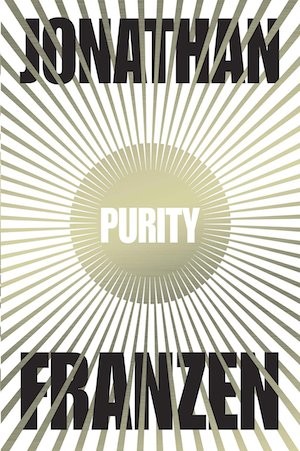It’s here! Genius declared ‘Great American Novelist’ Jonathan Franzen’s much anticipated new book Purity. In terms of compulsively readable, contemporary fiction with depth and humour, his last book Freedom was up there amongst the very best for me. Perhaps my expectations were too high, perhaps Purity is not as good as his two previous best-sellers The Corrections and Freedom, or perhaps you will disagree with me, but despite moments of brilliance, I found Purity to be an uneven book, oscillating between Franzen-esque genius and rushed, flat, even – dare I say it – boring writing.
As always, Franzen’s books are densely populated with eccentric characters. At the centre of Purity is Pip (whose real name is Purity), the child of new age, neurotic Anabel, who refuses to divulge the identity of Pip’s father. In search of a salary to pay her $130,000 student loan and her dad, Pip takes a job with the secretive Sunlight Project, a Wikileaks-type organisation based in Bolivia. Their leader, Andreas Wolf is a charismatic and intensely blue-eyed German who preys on young women.
This is the entry point to many stories told from different perspectives which all converge eventually. Or as Franzen himself called it: ‘a complicated machinery of a story’. We have Andreas’ dysfunctional upbringing in East Germany, weapons scandals, the unusual love triangle between brilliant journalist Leila, her author husband and her boss Tom Aberant, the story of Tom’s failed marriage and numerous examples of deeply dysfunctional mothers and absent fathers.
Although Franzen anchors his novels in interpersonal relationships there’s always a contemporary social and political commentary running along side it. In Purity we have the internet (a new kind of totalitarianism? Franzen is a vocal critic), access to information (or lack thereof), and how lives are shaped by truth and lies.
Franzen’s great strength is his incredible imagination, the twists and turns the story takes and the vast roster of original, often deeply dysfunctional and hugely entertaining, characters – it’s what makes his books stand aside from many others. In Purity, it backfires. The story races ahead, sometimes at break-neck speed, which somehow had the opposite effect of sucking me in, instead I lost interest. These passages become flat, un-engaging and surprisingly un-Franzen-like.
I much prefer the less frantic sections of the novel where the author delves on relationships be it familial, sexual or emotional. It’s when he calmly examines that he’s at his best with astute and often very amusing observations. Or when he succinctly puts words to what rest of us feel.
It wasn’t as if Pip felt good about making fun of her mother. But their dealings were all tainted by moral hazard, a useful phrase she’d learned in college economics. She was like a bank too big in her mother’s economy to fail, an employee too indispensable to be fired for bad attitude.
Despite my slight disappointment at this book, the moment I pick up my next book, I know I’ll miss Franzen’s clever reflections around what it is to be human and his stated ambition: ‘to leave nothing un-ironized”. Looking forward to his next now!
Purity by Jonathan Franzen is published by Fourth Estate, 563 pages.





